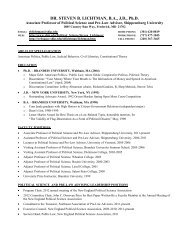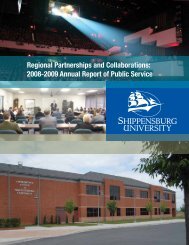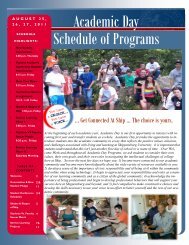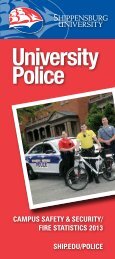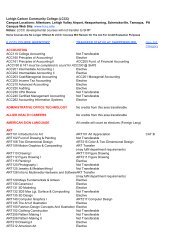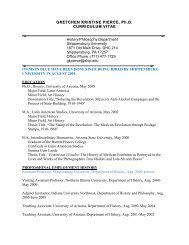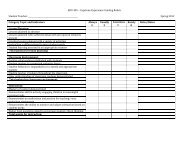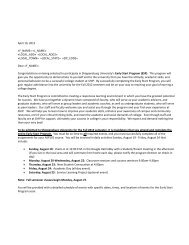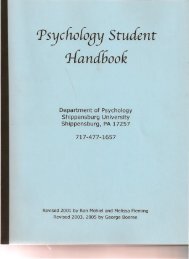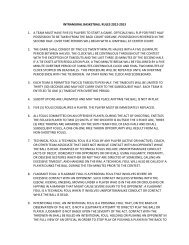Graduate Catalog - Shippensburg University
Graduate Catalog - Shippensburg University
Graduate Catalog - Shippensburg University
You also want an ePaper? Increase the reach of your titles
YUMPU automatically turns print PDFs into web optimized ePapers that Google loves.
<strong>Shippensburg</strong> <strong>University</strong>College ofEducation andHuman ServicesJames R. Johnson, Ph.D., Dean, College of Education and HumanServices (717-477-1373)Counseling and College StudentPersonnel DepartmentKurt L. Kraus, Ed.D., Acting Chair (477-1668)Clifford W. Brooks, Jr., Ed.D.Andrew L. Carey, Ph.D.Marcy J. Douglass, PhDShirley A. Hess, Ph.D.Rose Merrell-James, Ed.DKathryn Newton, Ph.D.Todd K. Whitman, Ph.D.Department Mission and Student Learning GoalsThe mission of the Department of Counseling and CollegeStudent Personnel, as an entity of <strong>Shippensburg</strong> <strong>University</strong>, its<strong>Graduate</strong> School, and the College of Education and Human Services,is to develop students’ academic and personal potential through acomprehensive counselor education program for graduate counselingand college student personnel students and through multi-facetedcounseling services for all university students. The department’s missionintegrates the principles of a meaningful learning environment,professionalism, and individual responsibility. It strives to be a respectedleader in the promotion of dignity, acceptance, and collaborationwithin the <strong>Shippensburg</strong> <strong>University</strong> campus environment.Specifically, it seeks to graduate highly skilled practitioners incounseling and college student personnel by utilizing experientiallearning opportunities in an atmosphere of intellectual, investigative,and creative scholarly curiosity. The department nurtures students tobecome congruent lifelong learners, noble practitioners, and leaders inthe profession who embrace scientific inquiry, technology, and innovativepractices. Through authentic relationships with invested facultywho model intentional practice based firmly in theory and culturaladvocacy, students develop the knowledge and skills necessary to bepurposeful, effective practitioners with a strong sense of personal andprofessional identity.Goals:• Students will become professionally oriented and practiceethically.• Students will become knowledgeable about the cultural contextof the practice of counseling and college student personnel andadvocate for its inherent value in practice.• Students will comprehend the importance of theories andmodels of growth and development across the life-span in thecounseling and college student personnel professions.• Students will become knowledgeable of the lifelong career developmentprocess and its relationship with wellness, identity,and life satisfaction.• Students will become skilled counselors and college studentpersonnel professionals who counsel, supervise, advocate, consult,collaborate, and coordinate.• Students will develop theoretical and experiential understandingsof group purpose, development, dynamics, counselingtheories, and methods and skills pertinent to facilitating groups(i.e., task/work groups, psycho education groups, and counselingand psychotherapeutic groups).• Students will become competent in the ethical use of individual,group, and environmental approaches to assessment,measurement, and evaluation.• Students will understand and apply research methods, quantitativeand qualitative analyses, needs assessments, and programevaluations.• Students will learn how to integrate technology into theprofessional practices of counseling, supervision, and collegestudent personnel.• Students will be effective professional communicators.AccreditationIn addition to the accreditations shared with the university, theCollege Student Personnel, School Counseling, College Counseling,Mental Health Counseling, and School Counseling programs areapproved by the Council for Accreditation of Counseling and RelatedEducational Programs (CACREP), a specialized accrediting bodyrecognized by the Council on Postsecondary Accreditation (COPA).CACREP approval is a professional standards accreditation thatvalidates the quality of education of counseling and related programs.Accreditation in counseling is closely related to the credentialingprocess established by the American Counseling Association (ACA).Upon successful completion of the National Counselor Exam, graduatesof CACREP approved programs are eligible to become NationallyCertified Counselors without additional supervised experience.Programs OfferedThe Department of Counseling and College Student Personneloffers graduate programs leading to the Master of Education degreein counseling with certification as dual (K-12) school counselor andthe Master of Science degree with specialization in college counselingor college student personnel. A 60-hour Master of Science degreewith specialization in clinical mental health counseling is also offered.Admission to ProgramAll applicants for admission to the Department of Counselingand College Student Personnel program must begin by applying tothe Office of <strong>Graduate</strong> Admissions. The Office of <strong>Graduate</strong> Admissionswill supply the applicant with required departmental applicationforms.Admission to the Department of Counseling and College StudentPersonnel is a process rather than a one-step event. Generally, theadmission procedure requires a full academic semester for processingapplications, credentials, references, supplemental data form, and theon-campus interview. Students are encouraged to begin this processat least six months prior to the desired starting date. Students mustbe interviewed and admitted to the counseling department beforethey will be allowed to enroll in counseling courses.Applicants for admission to the program must meet the requirementsfor the specialization and for the Department of Counselingand College Student Personnel in addition to the general requirementsfor admission to graduate study.1. Applicants are expected to possess relevant experience prior toadmission to graduate study. Applicants to the School Counselingconcentration are expected to have a minimum of a year’s experienceworking with children (for example, as a teacher, probationofficer, child protective services worker, etc.), and a 3.0 QPA inundergraduate degree work.Applicants to all other concentrations are expected to have aminimum of a year’s experience working or volunteering withindividuals or groups similar to those individuals that he/she plansto work with upon graduation from the program, and a 2.75 QPAin undergraduate work.48



